#wegscheid
Explore tagged Tumblr posts
Text

WEGSCHEID -> GERMANY
#Wegscheid#postkarte#post card#litho#litografia#lithograph#gruss aus#kartka#germany#niemcy#ansichtskarte
0 notes
Text
Sunday Stamps: Women
…is the theme for today’s Sunday Stamps Switzerland – 2022 Aargau is one of the most northerly cantons of Switzerland. It is situated by the lower course of the Aare River, which is why the canton is called Aar-gau. Wohltuend means pleasant, refreshing in German.Aargau presents itself as a spa canton on its special postage stampFour muses for the four thermal baths in Baden, Rheinfelden,…

View On WordPress
#africa#bather#cryptologist#Dolley Madison#europe#germany#renoir#senegal#serbia#Sunday Stamps#Switzerland#USA#Wegscheider#women#women stamp#WWI
0 notes
Text
Carmen, Natalie, and the Berzattos
CW: this post talks about domestic violence, addiction, mental health, racialised trauma, toxic masculinity and intergenerational trauma (this show deals with so much friends!).
Go gently with yourself if you choose to continue to read. Also its a long one (longer than my usual!) so fair warning if you're diving in: maybe put the kettle on.
Following on from The Claw, The Scrunchie and The Prayer Card metas (Part 1 and Part 2), I've been thinking more about The Berzattos (represented via Natalie's hair claw in Carmy's apartment) and their presence (seen and unseen) in season 3 of The Bear.
@espumado's fantastic meta on The Night of the Hunter and its use in The Bear, particularly as it relates to Natalie and the struggle she goes through in season 3 has informed a lot of this post. My reblog of that post also contains a lot of thinking that I had started to scratch at but haven't been able to expand upon until now. Also check out @currymanganese's brilliant analysis of The Night of the Hunter in the context of romantic relationships in The Bear.
Another source of information I've used in the research for this meta is this fantastic interview in the LA Times with the cast involved in 2x06 Fishes (thanks @brokenwinebox for sharing it!). Also thank you to @thoughtfulchaos773, @brokenwinebox and @devisrina for the chat about the above interview and discussions about Donna Berzatto's relationship with her son, Carmy.
Finally @vacationship's most excellent breakdown of the roles taken up by characters in The Bear according to Adult Children of Alcoholics ('ACA') roles defined by Sharon Wegscheider-Cruise and communicator types as developed by Virginia Satir has also informed this post.
The Berzattos
Okay so, given what we know about Carmy and about the Berzattos, it would seem obvious that, yes, his birth family is going to impact Carmy. I think its probably so obvious, that a lot of the fandom, myself included, have taken Carmy's relationship with his family for granted this season. To be fair, we were also getting Claire and the Faks shoved down our throats so some things flew under the radar including, in my view, the Berzattos.
What got me thinking about the Berzattos as a source of anguish for Carmy was a rewatch of 3x03 Doors - specifically Carmy's panic attack during that episode.
The first panic attack of season 3
At this late point in the episode, we've been watching Carmy and the crew's slowly escalating struggle with the demands of fine dining, when we arrive at Carmy running expo and calling for hands. His voice is hoarse and it sounds like he's been screaming for some time. His vision starts to blur and as he continues to call out for hands, we see glimpses of what appear to be intrusive thoughts, interrupting Carmy's work and triggering a panic attack. The sequence of shots that appear during this panic attack is below:
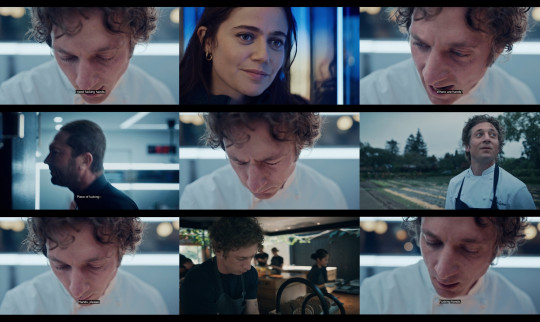
I note that Carm appears to be trying to come out of the panic attack by remembering his time at The French Laundry and Noma - much like memories of immaculately plated food helped him regulate during his panic attack in 1x08 Braciole and memories of Sydney helped him to regulate during his panic attack in 2x09 Omelette.
The final thought Carm has during this panic attack - indeed the thought he has when it appears that his panic attack is reaching its peak - is of his sister Natalie, in a church praying:
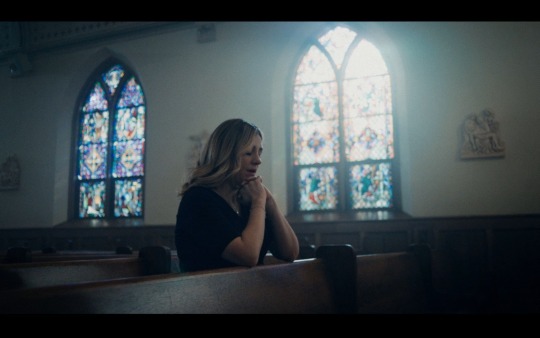
Note: I'm working on the assumption that the above memory of Natalie takes place at Marcus' mother's funeral. This is based on the clothes Natalie is wearing and how her hair is styled.
Its at this moment in his panic attack that you can see the crest in Carmy's emotions. The orchestral score during this sequence also builds to its climax at this point. Carmy's face screws into a tight grimace and he practically spits out the word, Fuck. Its only then that the music cuts away and we hear Sydney's voice bringing Carmy back to the present:
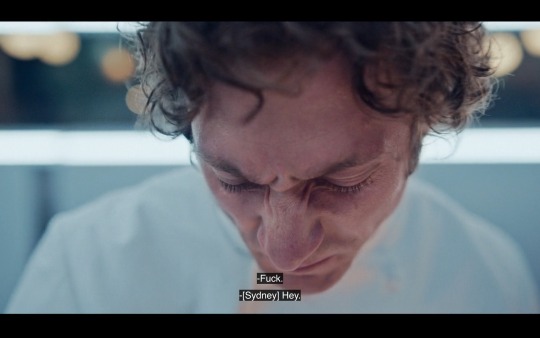
The fact that thinking about Natalie (praying while she carries the next generation of the Berzatto family) is what causes Carmy's panic attack to peak is what got me thinking more seriously about the impact of his birth family on Carm. ( This is something that others including @mitocamdria and @moodyeucalyptus have also picked up on here and here - the Bear hive mind at work!)
Below is my attempt to map these impacts out, from the perspective of intergenerational trauma, which can be described as,
"the apparent transmission of trauma between generations of a family. People who experience adverse childhood experiences growing up, or who have survived historical disasters or traumas, may pass the effects of those traumas on to their children or grandchildren, through their genes, their behaviour, or both, leaving the next generational susceptible to anxiety, depression, hypervigilance, and other emotional and mental health concerns."
I'd argue that intergenerational trauma can continue well beyond a person's grandchildren, particularly in cases where the systemic factors may have caused a trauma (for example: racial segregation, colonialism), continue to impact on multiple generations of a family.
So lets start by looking at Carmy's mother, Donna Berzatto...
Donna's trauma
I preface the below analysis with the caveat that we are not told what mental health diagnoses (if any) Donna Berzatto has (though she is clearly struggling with her mental health when we first meet her in 2x06 Fishes). The inferences I make below are based on what we have been told in the show about trauma that Donna has experienced.
Recall 3x08 Ice Chips where Donna and Natalie are talking in between bouts of Natalie's contractions. At one point in the episode, Natalie says:
I don't remember your mom.
To which, Donna sadly responds:
You don't want to.
Donna then becomes silently tearful remembering her mother.

Its clear from this very brief exchange that Donna has experienced some level of abuse at the hands of her own mother: Michael, Natalie and Carmy's maternal grandmother. That abuse has no doubt impacted on Donna's ability to parent her own children and likely influenced how she parented them as well.
As a mother myself, I've found that one of the hardest things about parenting has been avoiding the repetition of harmful behaviours that I've picked up through my own childhood. For all of us, the first - and often most memorable - models we have for how to parent have been the experiences we've had with our own primary caregivers (whether they were our birth parents or other adults in our lives). If those models were abusive or violent, we have to work that much harder to make sure we don't fall back on those examples when raising our own children. (And let me tell you, in the heat of the moment when your child is cracking a tanty in the grocery store, it takes A LOT to not revert to learned behaviours and instead take a step back and act from a rational place of calm lol).
For many folks who've had abusive childhoods, raising your own children can also be a very triggering journey. This article goes into a bit of why this is the case. If you've not been able to do any work on yourself or receive help to work through your own childhood abuse, you risk "blowing your trauma through" your children (I've borrowed the phrase "blowing trauma through" from African-American therapist and trauma specialist, Dr Resmaa Menakem, whose fantastic book My Grandmother's Hands has also influenced this post and a lot of my thinking about racial and intergenerational trauma). Given Donna's own history of abuse with her mother, its not a big leap to assume that she has "blown her trauma through" Michael, Natalie and Carmy with each of her children experiencing this in different ways.
There's also Donna's clear mom rage, no doubt built up over years as a single parent, and epitomised in the line from 2x06 (that broke my heart when I heard it because it resonated so much),
I make things beautiful for them, and no one makes things beautiful for me.
Based on the show's lore, up until 3x08 it wasn't evident that Donna had ever taken any steps to try and work through her own mental health issues and trauma. Once we get to 3x08 though, when Natalie says that she didn't tell Donna about her pregnancy because,
I just didn't want all the stuff you bring with you.
Donna replies by saying:
Yeah. I've been trying to put that stuff away.
Natalie then asks her mother how that process is going and Donna responds,
Its not easy.
Natalie then tells her mother that she's glad Donna is trying and Donna says she's glad that she's trying too.
Its not much, but the above exchange points to a slight shift in Donna's approach to her own trauma and to her parenting. This shift appears to have put Donna and Natalie's relationship on firmer footing than it has been in the past. Whether it will be enough for Carmy's relationship with his mother is another question and one I'm sure we'll see play out in season 4.
The Berzattos and Italian American racialised trauma
Other than the above exchange in 3x08 Ice Chips, we have no information about Donna's parents. I assume that Donna was born in America given her description of the Feast of the Seven Fishes (also known as La Vigilia) as described to Richie in 2x06 Fishes. During her description, Donna speaks about the Italian immigrants who brought "their seven best things" with them as if she's speaking about ancestors, not her own generation.
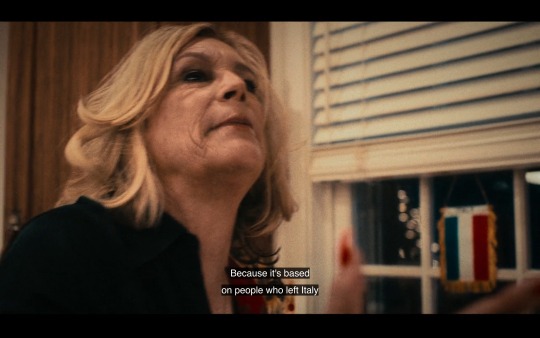
She does not use the first person here:
[I]ts based on people who left Italy to find new dreams and homes with new people. And they brought their seven best things from their sea to their new homes. And not so their families end up being a bunch of fuckin' jagoffs. (lmao)
Then Class A Jagoff, Uncle Lee storms into the kitchen and tells Donna that her retelling of the Seven Fishes legend is "not even close" and refers to all the sevens that occur in the Bible. Which is likely a closer explanation for the feast (see this overview on La Vigilia published on the Italian Sons and Daughters of America website). Notably, it was southern Italian and Sicilian immigrants that popularised the Feast of the Seven Fishes in America.
Given the above, it doesn't seem to me that Donna is a first generation Italian immigrant. Depending on the Berzatto family history, its possible that Donna is the daughter of Italian immigrants or the granddaughter of them. Her Italian ancestry could stretch even further back in time. At this point in The Bear, we don't know.
What we should note is that Italian immigrants and in particular, southern Italian and Sicilian immigrants to America, endured a history of racism in that country before their acceptance into the category of "white" in America.
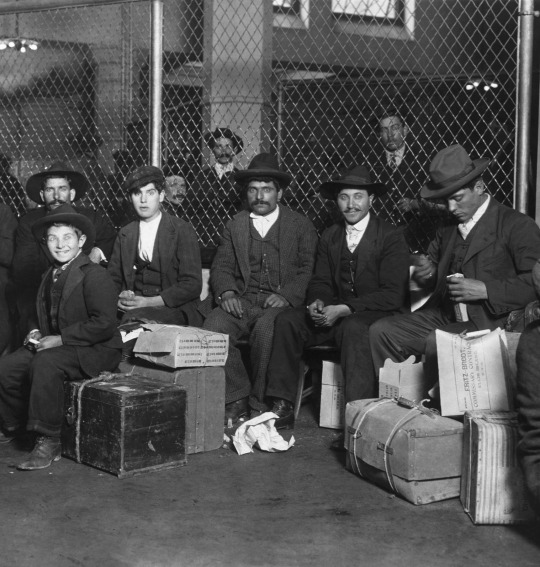
Image source: How Italians Became 'White', The New York Times
This NY Times article provides an overview of the racialisation of Italians in America over time. The article notes that,
"[d]arker skinned southern Italians endured the penalties of blackness on both sides of the Atlantic. In Italy, Northerners had long held that Southerners - particularly Sicilians - were an 'uncivilized' and racially inferior people, [considered] too obviously African to be part of Europe."
This racism of northern Italians towards those from the south of the country was no doubt tied to Italy’s own racist and violent colonial history, including its involvement in Europe's rabid "Scramble for Africa". In the course of its time as a colonial power, Italy came to brutally invade and occupy Eritrea, Somalia, Libya and Ethopia.
Note: I don't think its a coincidence that, Ebraheim, Somalian "grill master", medic and veteran of the American military intervention in Somalia, found himself working at an Italian American beef sandwich shop. Much in the same way that its no surprise that many folks in my Tamil family ended up in the heart of the British Empire - the UK - after fleeing civil unrest and genocide in one of its former colonies (Sri Lanka). As Tamil writer A.S. Sivanandan is famously quoted as saying about post-colonial migration: "we are here, because you were there."
Once they first arrived in America in the 19th century, racism against Southern Italians continued:
"They were sometimes shut out of schools, movie houses and labor unions, or consigned to church pews set aside for black people. They were described in the press as 'swarthy', 'kinky haired' members of a criminal race and derided in the streets with epithets [that were more commonly] applied to enslaved Africans and their descendants[.]"
Though while Italian Americans experienced the severe racial prejudice described above, particularly during their early history in America, some were still able to benefit from their European ancestry in ways that people with non-European backgrounds were unable to. This included: being able to apply for US citizenship, being able to marry, own property, and choose where to live - things that BIPOC people often faced great barriers (if not outright bans) to accessing.
Notably, in Chicago where the Berzattos are based, the history of Italian racialisation differed to other major cities in America. In Italian Immigrants, Whiteness and Race: A Regional Perspective (p. 6) Italian historian Stefano Luconi notes that,
[I]n Chicago, Italian Americans competed primarily with Polish immigrants, who generally turned out to be less hostile to them than Irish Americans in New York City or Boston, and overall their accommodation within the adoptive society was easier than elsewhere.
Given the above, the Berzattos' connection with Polish "family members" Uncle Jimmy Kalinowski, Uncle Lee Lane, and Cousin Richie Jerimovich appears rooted in a long history of Polish-Italian relations in Chicago.
Note: Ancestry.com tells me Kalinowski is a Polish and Jewish last name. Uncle Lee identifies as "Polski" in 2x06 Fishes and in the draft script for 2x06 is listed as Uncle Jimmy's brother. While Richie's ethnicity isn't explicitly stated in The Bear, in 3x04 Violet, he refers to his daughter Eva as żabka which is Polish for "small frog" and is also used as a term of endearment for girls or women.
Eventually Italian Americans were assimilated into the racial category of "white" both legally and in the popular imagination of the country. This happened in a few ways including via Italian Americans claiming whiteness for themselves, particularly in active opposition to Black, African American communities. This is despite their historic racialisation in comparison to Black, African-descent people (which, in a better world, could have been the basis for shared and sustained solidarity between the two communities). Luconi observes that,
"in Brazos County, Texas, Italian Americans learned to claim whiteness for self-protection, which involved showing off hostility toward African Americans in the mid-1890s [...] By the same token, after realizing the social benefits of being characterized by a white identity, Italian Americans in Baltimore embraced the racist premises of the local political leadership in the early twentieth century and joined two campaigns that unsuccessfully aimed at disenfranchising African Americans in 1905 and 1909 by amending the state constitution." from: Italian Immigrants, Whiteness and Race: A Regional Perspective (p. 15)
The above NY Times article states that in 1892, the lynching of 11 Italian immigrants who were accused of killing a police chief in New Orleans resulted in Italy breaking diplomatic relations with America. As a result of this and to prevent unrest in the Italian American community, US President Benjamin Harrison proclaimed 12 October as "Columbus Day" and encouraged Americans to celebrate the contribution of the Italian Christopher Columbus to the creation of America.
Apparently, this sleight of hand (a legerdemain because it: (a) magically erased generations upon generations of First Nations who have existed in the Americas long before Columbus' arrival (and who continue to do so), and (b) because it vanished the explorer's penchant for rape and enslavement of the First Nations' people that he did encounter) was enough to reinstate diplomatic relations between America and Italy as well as carve out a place for Italian Americans in the white, American imaginary.
Indeed, despite recent calls to stop the celebration of Columbus Day led by First Nations people across America, it is Italian American organisations (including the Italian Sons and Daughters of America) and prominent Italian Americans that are some of those voices leading campaigns to keep Columbus Day as it is, reductively and disingenuously dismissing its critics as attacking Italian-American heritage.
Note: the above views are obviously not shared by all Italian Americans. See below protest staged by Italian Americans in the Berzattos' hometown of Chicago, in opposition to the city's Columbus Day Parade (Source: Fox 32 Chicago):
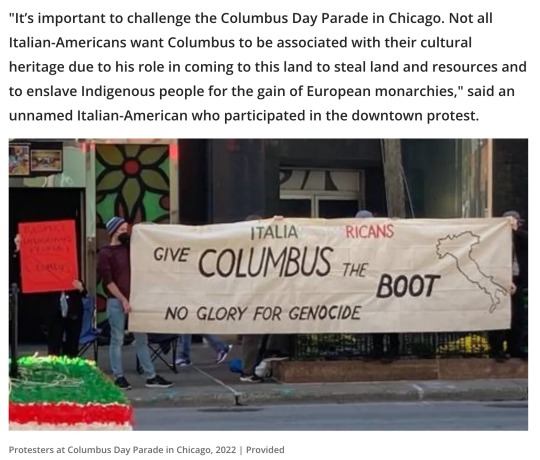
One of my heroes, Toni Morrison, once said of American national identity,
"In this country, American means white. Everybody else has to hyphenate."
White supremacy operates amongst racialised communities through divide and rule, with these communities pitted against one another, trying to achieve as close a proximity to whiteness as possible. In the US context, that proximity brings those communities closer to what is perceived as "American". The above examples show how some Italian American communities in America shifted the racial categorisation of their community to "white" over time by fighting for that proximity. I would argue that that shift came at a great cost, as all racism does: a cost to the BIPOC communities that were fucked over in the process and a cost to the souls of those now "white" Italian Americans who participated in divide and rule to get closer to a white supremacist position of power. Dr Resmaa Menakem would refer to those costs as traumas for both BIPOC communities and (now) white, Italian American communities.
In My Grandmother's Hands, Dr Menakem discusses the impact of racialised trauma on white people. Specifically, that white supremacy - or as Dr Menakem refers to it, "white body supremacy" - is itself a trauma response. I won't get into the details of this framework (and make this post longer than it already is lol) except to say its fascinating and I'd encourage you to read My Grandmother's Hands to find out more. Its relevance here is to illustrate that on top of our individual, personal traumas, we each carry with us racialised trauma. I make the point of articulating this because while The Bear alludes to race (sometimes masterfully as in this scene where Donna tries to play divide and rule in her own way), it often does so obliquely in ways that are not always obvious to viewers (for example, see director Ramy Youssef's discussion in Variety about the bike crash scene in 2x04 Honeydew). But make no mistake, race permeates this show.
For example, I think about Uncle Lee’s jab at Mikey in 2x06 about the latter living with his mom, and compare this to Marcus living with his mother throughout seasons 1-2 or Sydney living with her father in seasons 1-3. I think about how in many communities of colour, multi-generational living isn’t seen as shameful because the focus is not just on financial dependence but on relationships and care. Certainly, an adult child might not be financially independent but if they are caring for their parent, this is something to be valued.
I think about how the move to individualism (championed by Uncle Lee) away from family and community (features that Italian culture is historically very well known for) is a shift that, for many Italian Americans, may be viewed as a cost incurred as a result of an allegiance to white supremacy.
I think also about the words of Tema Okun, who wrote about how white supremacy shows up in organisational and professional settings in her 1999 article "White Supremacy Culture" and how in that work, Okun noted particular identifying characteristics of organisational, white supremacist culture, including (but not limited to):
individualism;
perfectionism;
either/or & binary thinking; and
a sense of urgency.
Sound familiar? I thought they might. These are traits that Carmy has exhibited in almost every episode of season 3 (and periodically in seasons 1-2). Notably, these are traits that are also valorised in the world of fine dining, as we see it through Carmy's eyes throughout season 3 (in flashbacks and in how he chooses to run The Bear). And we all know how well this shit is going for our man (lol).
I'll get into this more in an upcoming meta (again, this is me manifesting in a bid to force myself to finish writing the thing lol), but I just wanted to point out how both in terms of his racialisation and his professional career, Carmy is immersed in white supremacy - whether he wants to be or not - benefiting from its privileges while also being witness and therefore, subject, to its horrors. No one escapes this shit, not even those who've been welcomed into the fold at the top of the hierarchy.
All of this - the racialised history and trauma associated with the Italian American community as well as the clear whiteness that marks the fine dining industry - makes Carmy's character that much more fascinating to me. Here is a character with seemingly no personal prejudices towards BIPOC folks. He loves the BIPOC folks in his life quite dearly (in particular, Marcus who he treats as a brother, and of course Sydney, in whom he's found a soulmate). I think this is likely due in large part to the role Carmy's siblings (Mikey and Natalie) played in raising him. These two characters also appear to care deeply for the BIPOC people in their lives without much of the prejudice that many who have been racialised and socialised in their community might harbour. And in their roles as surrogate parents for Carmy, they appear to have modelled that healthy and normal (because we must remember, what is abnormal is racism) respect for their fellow humans. They're not perfect in this (recall 2x06 and Mikey's bombastic objectification of Claire) but we do see repeated glimpses of their goodness throughout the show (recall 3x06 and Mikey's kindness to Tina, or the pantry scene in 2x06 and the gentleness he displays towards Carmy there). This is in contrast to their mother, Donna, who clearly has done no work to prevent blowing her own racialised trauma and prejudice through the bodies of her kids.
Also while the racialisation of The Bear's BIPOC characters is readily apparent (because the white supremacist culture of the West is more attuned to looking at non-white people and automatically seeing race), its white characters are also racialised and have racialised histories. The above was my attempt at stepping out a bit of the racialisation of The Berzattos, of Carmy, and of the racialised trauma that they also carry with them.
Phew.
Okay, now back to the Berzattos...
Carmy's birth
Recall 3x08 Ice Chips and Donna telling Natalie the stories of each of her children's births. By far, the birth that appears to cause Donna the most rage, the most pain, is Carmy's. It also happens to be the only birth out of her three children that her (by all accounts) deadbeat husband is present for. Donna describes fighting with her husband during the entirety of her labour with Carmy and that the hospital was fucked because it seemed like everyone went into labour at the same time. She then tells Natalie that Carmy took a long time to arrive:
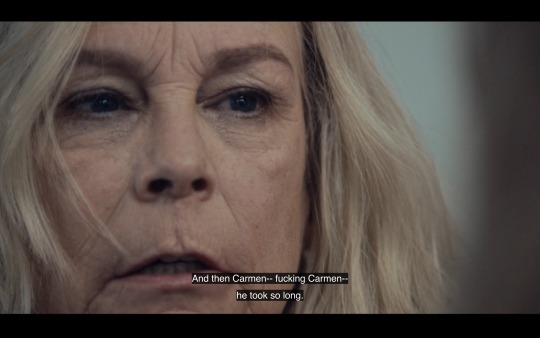
Note: Its not lost on me that Carmy's obsession with speed, rushing and sense of urgency was almost definitely drilled into him from birth, given the rage with which Donna describes his "slowness" in being born.
Donna then goes onto express how frightened she was and the further difficulties involved in Carmy’s delivery:
It was so hard and so scary because he kept getting stuck, and they just kept having to move me, and I remember they were moving me in all these positions. And then at one point, I think they had me fucking upside down or something.
And then, so brutally it becomes darkly funny (I've pushed a kid out too: it can be so painful, if you don't laugh, you'll sob hysterically lol), Donna describes Carmy's birth as just all around fucked:
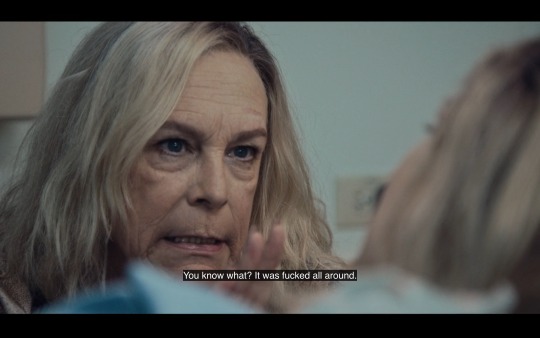
The whole thing was fucked:
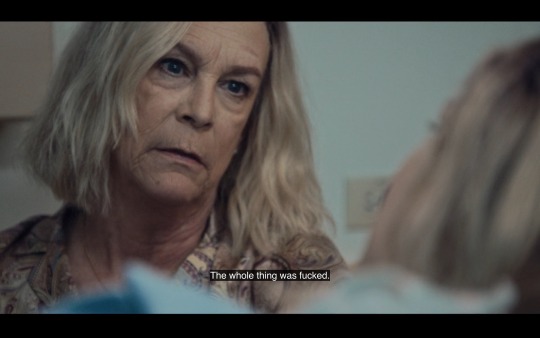
No seriously, very fucked:
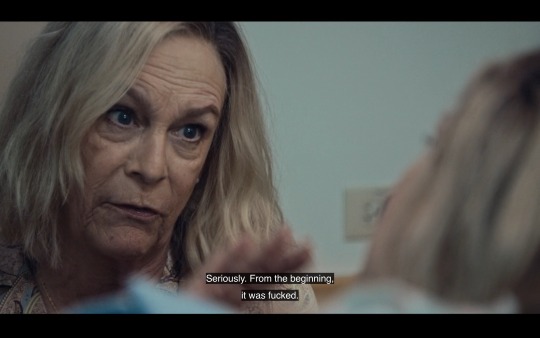
So Carmy entered the world and the experience of his delivery was fucked nine ways to Sunday for his mother. A very difficult beginning to this life for a baby, to say the least. I would go so far as to say, given the way Donna is recounting Carmy's birth, that she experienced birth trauma, and possibly developed birth-related post-traumatic stress disorder (PTSD).
Contrast this with how Donna describes Michael's and Natalie's births:
Despite Michael also having difficulty being born (Donna recalls that it seemed like "he wanted to stay" in the safety of her womb), Donna says that she felt really good, great and strong during her labour with him and that his birth was even described by a doctor as an "amazing" one.
Donna describes Natalie's birth as "beautiful" with Natalie arriving after Donna had had a restful sleep and a vivid, prophetic dream. Donna then goes onto tell Natalie that she was delivered in the presence of a "sweet" girlfriend (Cicero's first wife, Gail) who sat with Donna during labour and who played "Baby, I Love you" for Donna as Natalie arrived.
The differences in how Donna recalls Mikey, Nat and Carmy's births and Donna's propensity in the past for holding her children's "mistakes" over their heads (recall 2x06 Fishes and the story of how Natalie got the nickname "Sugar"), make me think that she was likely to have rubbed Carmy's difficult birth in his face when he was younger. I think that Donna was also likely to have either intentionally or unintentionally (or perhaps both, depending on the circumstance) made Carmy feel less than his older siblings, maybe not as wanted. We have some evidence pointing to this happening in Carmy's past, peppered throughout the show.
Growing up in the Berzatto house:
As a child Carmy had a stutter, which causes speech to inherently slow (as it takes longer to form words and sentences). He was also scared to speak. Now a stutter in and of itself would not make the person speaking scared. Its other people's reactions to a stutter that would do that. Given Donna's vitriol at how slow Carmy's birth was, and her obsession with time (anyone fancy a kitchen timer? this lady's got 700 of them), its not a stretch to imagine that any delay in Carmy articulating himself as a child would have been met with ridicule or rage from his mother.
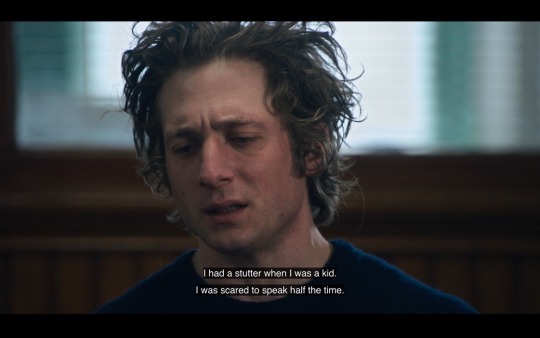
We know that all the Berzatto children grew up scared of their mother, a survivor of abuse herself, and an addict who drank to excess with clear mental health issues that it didn’t appear she was seeking treatment for. Recall Natalie's disclosure to Donna in 3x08 Ice Chips:

Carmy also grew up embedded in a particularly toxic type of white, heterosexual masculinity embodied by his brother Mikey and "cousin" Richie (who undoubtedly had it blown through their bodies by family, friends and the white supremacist, homophobic culture we are swimming in, in the West). I've previously discussed this in my meta on the use of 90s alternative rock in The Bear and more recently, in this reblog of @mitocamdria's meta Sublimation and Intellectual Orgasms.
Carmy gets called "a weird little dude" for knowing how to mix a drink in 2x06. He gets called a "gayrod" for owning the Noma cookbook in 1x01. He gets called a "soft shitty bitch" for calling Pete instead of Natalie in 1x05. He gets called a "mopey little fuck" in 2x06 for questioning Mikey and Richie right before they accost him with a veritable wall of gross dudebro, horndog descriptions of Claire (a girl they know and are friends with - again, fucking gross). Carmy hears his mother describe Steve as "gay" for being "arty" in 2x06 (recall that Carmy is also "arty" in that he can draw and likes fashion). If you weren't performing alpha-male dominance like Mikey, Richie, Uncle Lee or even Uncle Jimmy, the Berzatto household was a rough place to be. Truth is though, that all of those white, alpha-males have their own demons, and in the case of Mikey, those demons drove him to take his own life. The truth is that, like white supremacy, no one escapes toxic masculinity unscathed either.
We know Carmy suffered from low self-confidence as a child which might have led him to feeling aimless. He tells us in 1x08 Braciole that he got shitty grades because he couldn't pay attention in school, he didn't get into college, didn't have any girlfriends or many friends for that matter. Carmy also tells us in that same monologue that he wasn't "built" in the same way as his brother, who could walk into a room and take its temperature right away, who was loud, hilarious and magnetic.
I think about how for someone like Carmy, Mikey would have cast a long shadow. I think about how hard it would have been to have lived under that shadow while trying to figure yourself out.
It wasn't until working in fine dining that Carmy found his purpose. He says in 1x08,
For the first time in my life, I started to find this station for myself.
This must have been intoxicating and affirming for Carmy. Yet I think about how, after all that, he could return home having achieved accolades and fanfare in his career, try his best in the chaos of a Berzatto family Christmas to diffuse the powder keg that is Donna, and still be called "Michael" by his mother, his very existence in that moment, feeling like a puff of smoke.

We also know that Carmy's eldest siblings ended up being like surrogate parents for him. Mikey almost certainly was a father figure given the absence of his biological father in Carmy's life. Its not a stretch to imagine Natalie as taking on the role of a surrogate mother, given Donna's abuse and how Natalie looks out for almost everyone throughout seasons 1-3 of The Bear. In this video, Jeremy Allen White also talks about the tattoo Carmy has of two angels with a sun in between them as representing his brother and his sister, further confirming the roles of his "guardian angel" siblings.
I think about Natalie, parentified big sister that she is, sneaking a wad of cash into Carmy’s pocket as he leaves her and Chicago for New York in 3x01. I think about her calling him “honey” in that same episode as she affirms that she knows how good he is at being a chef - “honey” being a term of endearment commonly used in family settings but between parents and their children, not as commonly heard between siblings.
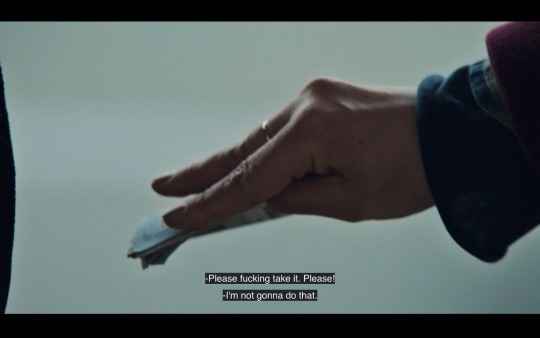
I also think about Mikey being born the eldest, the first and only (for a time) to have to deal with his mother's trauma and expectations. I think about how he took on the work of looking after his mother and his siblings when his father left the Berzatto home. I think about how Mikey is described by the actor who plays him, as a "dreamer who's not allowed to dream. He has to take care of everybody."

Loose ends
Another set of incidents haunting spread throughout season 3 also raised concerns for me, in that they remain unresolved and point to a resolution or confrontation for Carmy and the Berzattos in season 4. I named them in my reblog of @espumado's post on The Night of the Hunter. For ease of reference, I'll bullet point them here:
Carmy finds a box labelled "DD" (his mother, Donna's nickname) at The Bear at the end of 3x05 and looks through it. He appears frozen as he finds a baby photo of his mother holding a baby I assume is him. The episode ends at this moment and neither the box or Carmy's reaction are revisited for the remainder of season 3

Cicero tells Carmy during 3x09 that Donna wants Carmy to call her back about "the baby" (one assumes this is a reference to Natalie's baby) and that Carmy has been "fucking avoiding it" (one assumes again that the "it" here is the baby...but maybe its also just the act of calling Donna back)

But then Carmy says something strange:
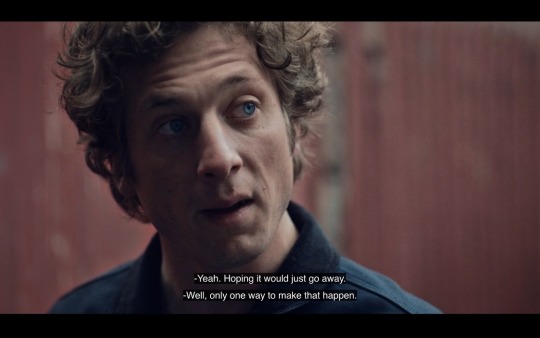
Yeah. Hoping it would just go away.
Surely, Carmy's not talking about a baby. Babies can't just go away. And I don't think Carmy is so malicious that he'd wish his sister's child to disappear. I also don't think Carmy would refer to his mother as "it" (he's never done so up to this point on the show, as monstrous as she can be).
And in case you were wondering, Cicero's response to Carmy also doesn't sound like it applies to a baby or Donna (lol):
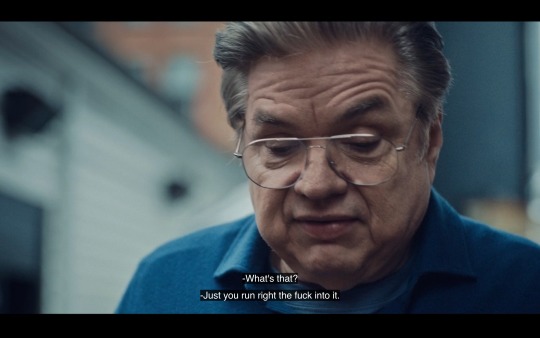
[Y]ou run right the fuck into it.
Intergenerational trauma and legacy
So what is the "it" that Carmy wants to go away? What is the "it" that Uncle Jimmy tells him to face by running "right the fuck into it"? My suspicion is that this is Carmy's baggage. The baggage that comes with being born a Berzatto and being born to Donna. All the stuff that we've been talking about here. Its also the baggage that both Nat and his mother have been trying to "put away":

Above from 3x02 Next: Natalie in conversation with Carmy. "Its not great 8am stuff."

Above from 3x08 Ice Chips: Donna in conversation with Natalie.
Carmy is trying to do this too: put away his baggage, while having been the "Lost Child" (referring to ACA roles and the recording about them that Natalie was listening to at the end of 3x07 Legacy) and the youngest child in his family for so long but now having to be the "Hero". @vacationship's post on ACA roles as they relate to The Bear gives a great breakdown on what the "lost child" and "hero" roles mean.
In the LA Times interview mentioned above, Jeremy Allen White says,
I don't think Carm's ever been outside of himself enough to really take in another person in their entirety, sadly. I think that's Carmen's real struggle.
As the youngest child of the Berzattos, Carmy has never had to step outside of himself to the extent that Mikey, Natalie or even Donna have had to. He has never had to care for anyone other than himself, until he inherits The Beef. And that responsibility is a HUGE one.
But Carmy jumps into that role, initially fuelled by the desire to retroactively fix his relationship with Mikey and fix "the family". Recall again his monologue in 1x08 Braciole:
[I]ts very clear to me trying to fix the restaurant, was me trying to fix whatever was happening with my brother. And I don't know, maybe fix the whole family because that restaurant, it has and it does mean a lot to people. It means a lot to me.
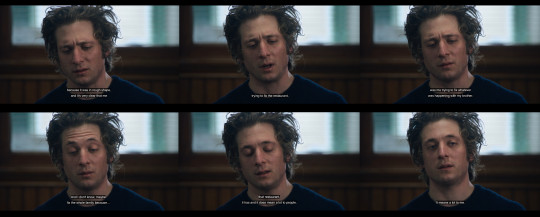
For the longest time, I interpreted "the family" that Carmy refers to here as his chosen family: the crew at The Beef. I think that while that was true, it wasn't the whole picture. I think Carmy was actually being more expansive in his definition of family to include his entire family: chosen and birth.
So while Carmy is obviously trying to make The Bear a success for Sydney ("Syd, we're going to get a star") and for Marcus ("Take us there Bear", "Yes, Chef"), as well as for the rest of the chosen family he first found at The Beef, Carmy is also trying to fix the restaurant for the Berzattos. Specifically, Carmy is trying to do what his father and brother couldn't do in keeping The Beef/The Bear going. He is trying to embody the Hero ACA role, vacated by Mikey with the latter's passing, even though his sister told him from the start, in 1x01:
No one's asking you to.
What I think I took for granted this season was just how much Carmy's desire to repair the legacy of the father figures in his life (as represented by the restaurant) was brought to an urgent and frenetic head for him in the late stages of Natalie's pregnancy. Upon rewatch of 3x09 Apologies, I picked up on some interesting script choices and imagery that I think have been chosen purposefully to relay to us that this is the case and that the impending birth of his niece is indeed, weighing on Carmy.
Now, at the start of 3x09, Carmy may or may not know Natalie has just had her baby. I assume he does. After Marcus watches that clip about magic, followed by unnecessary Fak, Claire and dumpster content (lol) and then Sydney practising how she's going to break Shapiro's offer to Carmy, we cut to the kitchen of The Bear and we hear Carmy calling out orders while running expo. He's yelling again. His voice is hoarse like it was in 3x03 during his panic attack. We see Carmy's intrusive thoughts at a rapid clip intercut with close ups of his, Sydney's and Richie's faces. We also hear Carmy repeatedly yelling at the staff to push:
Please give me the fucking agnolotti. Push.
Lets fucking push, please. Lets fucking go.
Push, please.
Push, chefs! Please! The cook is fucked. Refire, please.
Push.
From a quick google, "push" is used in restaurant settings but not in the way Carmy's doing here. I've seen it used to mean "sell" an item (as in getting a server to "push" a particular dish to diners so they order it) as well as to describe a busy period during service (as in the restaurant is in the middle of a "push").
In 3x09, Carmy is yelling “push” like a midwife at his sister's side while she pushes out her child, the next generation of Berzattos, into the world. But instead of his niece, Carmy is trying to deliver one more in a litany of dinner services at The Bear.
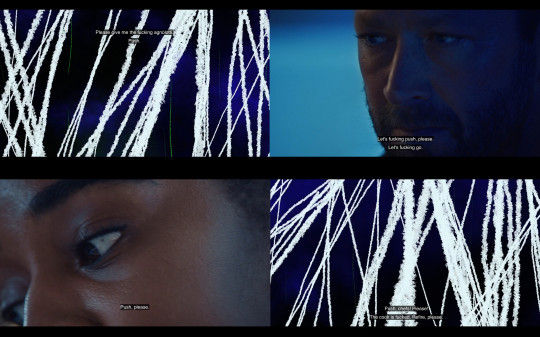
Note: you can clearly see here that the jagged lines that have appeared since season 1 when Carmy is having intrusive thoughts are actually made up of what look to be hundreds of claw marks. I've noted in a previous reblog of one of @thoughtfulchaos773's posts (that I can't find atm sorry) that this evokes Carmy (the Bear) trying to claw his way out of a mental spiral and back to equilibrium. @currymanganese also noted that the lines themselves look like a neural network, driving the point about Carmy's mental state home.
And then directly after the above "push" scene, we see copious amounts of water ejected over the The Bear's kitchen island, washing away flesh coloured food and sauce that looks like blood splatter:
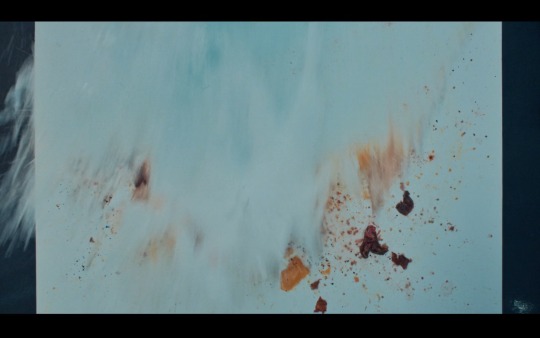
Having rewatched 3x09 through the lens of intergenerational trauma, with the spectre of Natalie's labour, Carmy's apparent resistance to seeing Natalie or her baby, and having just heard his hoarse voice screaming push, push, push...to me this water started looking a whole lot like birth waters breaking, and amniotic fluid flooding The Bear:
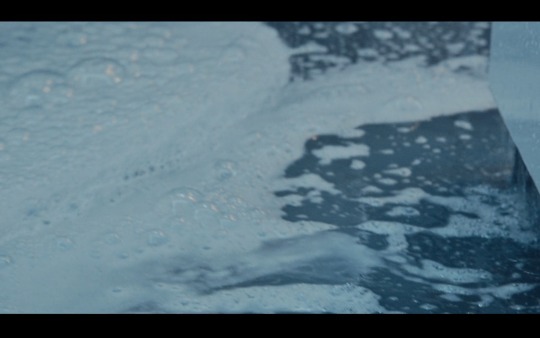
Note: Rest assured, amniotic fluid doesn't contain all those suds.
@espumado pointed out in their The Night of the Hunter meta that the song playing during the above "push" and "broken waters" scenes of 3x09 is a song by Trent Reznor and Atticus Finch from a war documentary. The song is "The Forever Rain" from the documentary series The Vietnam War by Ken Burns and Lynn Novick. I'm sure its no coincidence that a song from a documentary about the Vietnam War - a war whose veterans were the first to be assessed for post-traumatic stress disorder (PTSD) - is being used in a scene acting as an allegory for childbirth, given what we know about how traumatic Carmy's birth was for his mother, and inevitably, for him as an infant.
So why is Carmy so preoccupied with Natalie's pregnancy and the birth of his niece?
I think this all ties back to what Carmy told us in 1x08: that he wants to fix the restaurant (and in the context of season 3, this means making The Bear a success) and that in doing so, fix his family.
Note: which is also why I think we are shown that magic clip that Marcus is watching at the beginning of 3x09 with this bit of dialogue from it: "What makes magic different is that its inherently honest. You tell someone you're gonna deceive them before you deceive them. In some way, that makes it more difficult." We were told in 1x08 what the restaurant means to Carmy and his reasons for fixing it, but Storer and co have spent all of season 3 distracting us with Claire and Fak-shaped sleights of hand getting us looking elsewhere to understand Carmy's behaviour. By 3x10, Carmy's motives haven't changed. He's doing this for his family. All of his family.
Specifically in the context of Nat's pregnancy, Carmy wants to ensure that The Bear is a success for the next generation of Berzatto children, for his niece. And if Carmy is being haunted by a need to fix his family's legacy, particularly given the impending arrival of Natalie's baby - the youngest Berzatto after him - then his desperate, rageful plea to Syd after she brings him back from his panic attack in 3x03 Doors, is even more distressing:

They're going too fucking slow!
What Carmy means is:
I'm going too slow and this restaurant is going to fail because of it. And this baby is going to inherit my failure, just like I inherited Mikey's and just like he inherited our father's.
Remember: Natalie is a part owner of The Bear and so any financial failure of the restaurant will be felt by her and her family just as it would be felt by Carm.
What Carmy needs to realise is that while a brick and mortar institution may fail, what remains are the relationships, the people that he has met because of it (shout out to Chef Terry and her speech in 3x10 Forever, also shout out to Mikey and his chat with Tina in 3x06 Napkins). And if there are people - if there are relationships - there's always the chance to build another future together, again.
Conclusion (yep, I'm almost done)
I think about how whether he likes it or not, Carmy was able to pursue his passion in cooking because of his family’s racial (and class) privilege, particularly as a member of a community that was invited to join in the spoils of white supremacy. This privilege was most clearly embodied by the fact that the Berzattos had the means to own The Beef and the culinary opportunities for Carmy that flowed from that work and experience (contrast this with Sydney, Marcus and Tina's experiences in entering this field, which I've discussed here and which @freedelusionshere discusses here).
I think about how Carmy subverted and used that privilege to bring along the original crew of The Beef with him to The Bear, lifting up his largely BIPOC employees. And then I think about how he ran roughshod over them in order to try and meet the insane expectations he'd set for himself (in large part, as a result of his family's history).
I think about the safety net that Carmy had with Natalie and Mikey who were there to take care of The Beef, their family and their unwell mother, giving Carmy the room to find himself professionally. I think about Mikey leaving behind a restaurant for Carmy but also leaving behind an entire family for him too.
I think about Carmy not realising that while The Beef was a burden in some ways, it was a blessing in so many others.
I think about the clear intergenerational trauma that Carmy is contending with while trying to balance so many perceived, competing demands.
I also think about Donna's dream, the night she went into labour with Natalie:
In this nothing dream, I mean nothing dream. And it wasn't Chicago, and it wasn't New York. It was some sort of hybrid city, you know? And there was a fish tank. Big fish tank in the middle of the city. It was this giant fish tank, and I was the only one looking at it.
[...]
And I remember the colours were, they were so sharp and vivid and neon, you know, and I was the only one looking at it.
[...]
I was just staring at it for the longest time. And all of a sudden, I noticed that the glass started to come apart like it was gonna split. But I wasn't worried, you know? It wasn't bad, because I knew that more people were gonna get to see these beautiful fish.
And then I woke up, and I was sweating, and my water had broke.
When Donna had her children, she had no idea that she would lose her eldest child to suicide. She likely had no idea how far she was going to push her daughter away from her due to her abuse, and she most certainly did not know that her youngest would cease contact with her for years while becoming a renowned chef. None of us parents know for certain how things are going to turn out for our children, or for our relationships with them.
We can only hope, and do our best: do our best to break harmful cycles while trying to nurture children who will leave the world a better place than it was when when they arrived. And if our kids manage to do this not because of us but in spite of us, in spite of our slip ups and mistakes, in spite of our baggage, then honestly, we should be even prouder of them. Because it meant they were able to integrate our trauma, our histories, and their trauma, and their histories, all of it, and make something beautiful, something better.
And I think I can see why Donna wasn't worried when the fish tank started to crack. I get why she was so happy that more people were going to get to see her beautiful children and the world they were going to create, in spite of everything and because of everything.
As usual, tagging folks who might be interested (absolutely no pressure to read this fucking long ass thing though), but keen to hear from anyone who wants to discuss:
@currymanganese @thoughtfulchaos773 @moodyeucalyptus @vacationship @mitocamdria @brokenwinebox @espumado @tvfantic87 @turbulenthandholding @anxietycroissant @angelica4equity @devisrina @kdbleu @freedelusionshere @ambeauty @afrofairysblog @fresaton @hwere @ciaomarie @ambeauty
#the bear#the bear fx#the bear hulu#sydcarmy#the bear meta#the bear season 3#carmen berzatto#sydney adamu#natalie berzatto#mikey berzatto#richie jerimovich#tina marrero#marcus brooks#ebraheim the bear#uncle jimmy
102 notes
·
View notes
Text
Engel, Wörthersee Stadion, Klagenfurt, 17-07-2024 © Tamara Wegscheider
#nice view#powerful voice ❤️#till is love 🖤#till lindemann#rammstein#rammstein 2024#europe stadium tour 2024
30 notes
·
View notes
Text

Schrammen
1.
Ceci n'est pas Polarforschung. Schramm dankt, aber nicht dem (Edgar) Wind und nicht dem (Aby) Warburg, denen er doch so viel zu verdanken hat. Zwischen Schramm einerseits und Warburg und Wind andererseits hat sich inzwischen geschoben, was Schramms Sohn Gottfried wohl eine Wegscheide der Weltgeschichte nennen würde.
2.
Schramms Welt kenne ich gut. Inzwischen kenne ich auch Warburgs Welt gut. Schramms Welt ist mir aber lange und seit Kindheit vertraut, die ist mir bis ins meteorologische Drumherum 'familiär', denn Schramm war Kollege und Freund von Karl Brandi, dem Vater von Stamm Göttingen (Vater von Diez Brandi, der das deutsch-römische Rathaus in Aschaffenburg gebaut hat, zusammen mit Hermann Kasper, dem Ausmaler der Reichskanzlei). Deutsche Professoren, very deutsch bis in die Faszination für Rom hinein.
Das ist mir familiär, aber das heißt auch, dass ich ahne, wie Schramm dazu kam, auf falsche Pferde zu setzen und wie er dazu kam, dem Aby Warburg, der doch auch schon mal im ersten Weltkrieg auf falsche Pferde gesetzt hatte, später nicht mehr zu danken und auch dem Wind nicht mehr zu danken, nicht einmal in dem Buch, das jene Objekte behandelt, die man mit Warburg und Wind als diplomatische, meteorologische Polobjekte verstehen sollte und zu denen sie das meiste und anregenste Zeug zu sagen hatten. Man muss nur das letzte Bild in diesem Buch sehen, ein Foto von der Baustelle des 'Atomiums' in Brüssel, um zu erkennen, wieviel warburgesker Witz darin steckt. Percy Ernst Schramm, du hättest ruhig sagen können, wo es die beste Zuflucht für solche Witze gab und wo man vor allem ermutigt wurde, so einen Witz zu haben: in der KBW. Das hätte dein EGO nicht verkleinert und nicht deinen Status als quasipreussischer Beamter. Jetzt ist es zu spät, du bist tot und kommst nimmermehr, das ist schade, das ist traurig. Gute Witze verschenkt man großzügig, aber nicht so, nicht auf so eine nachlässige Weise, die verleugnet, wo die ermutigenden Stellen waren. In Sachen Witz muss man sich einfach an Leute wie Lubitsch, wie Warburg, wie Wind halten. Das wird weder das Ego noch das Amt beschädigen.
Schramm ist so stolz zu sagen, er würde in dem Buch denjenigen danken, die mit A und O beginnen. Das sind ihm zu dieser Zeit die Bild- und Rechtswissenschaftler Alfördi und Ostrogorsky, von dem wiederum Schramm explizit hervorhebt, der sei vor den Roten geflohen. Es gibt auch Leute (viele gute Anwälte zum Beispiel!) die sind schon 1905 geflohen, vor den Weißen, vor den von Stendhal so genannten Schwarzen, oder sie sind schlicht vor dem Hunger geflohen, darum ist diese eindeutige und einseitige Stellungnahme gegen die Roten wichtig. Wer im kalten Krieg baden will kriegt von mir heißes Wasser, bis er heiße Füße bekommt. Habe ich da ein fehlendes Freiheitsverständnis, fehlt mir gar jegliches Freiheitsverständnis? Die Leute sterben hier wie dort wie überall für ihr Verständnis, sie lassen ihr Liebstes dafür los. Aby, dessen Familie vor Beamten wie Schramm einer war, auch flüchtete, ist mit A nicht gemeint, gemeint ist wie gesagt Alfördi, vielleicht war der fugenlos. Weder dem Alfördi noch dem Ostrogorsky lässt sich etwas von ihrer Großartigkeit absprechen, Warburg und Wind lassen sich nicht gegen die beiden Bedankten ausspielen. Wenn Schramm aber die Polemousophie schon in sein Buch einlädt, sollte sie die Einladung annehmen - und die Schwesterchen Polarität, Polizei und Politik mitbringen.
3.
Karl Brandi, da bin ich mir sicher, hätte die Polemousophie nicht eingeladen, er hätte die Polarität kaschiert, unterschlagen, sobald dadurch sein Status hätte wanken oder auch nur wackeln können. Der war ein Meister dessen, was Luhmann die kontrafaktische Stabilisierung nennt. Da scheint Schramm mutiger, vielleicht aber auch dümmer? Schon wenn Karls Bruder Paul (mein Urgroßvater) nur im Witz am Status rüttelte, so lauten die Geschichte, gab es angeblich ein zurechtweisendes Gewitter, jupiteresken Blitz und Donner. Es soll sich schon am Protokoll, an der Reihenfolge beim Sitzen an der Tafel entzündet haben. Karl, der sog. Erstgeborene, habe angeblich darauf bestanden, dass keiner sitzt, bevor er sich setzt. Fachmann für römische Diplomatie und Protokoll war er, darum notiert Warburg noch am Abend vor dem Abschluss der Lateranverträge auch Karls Namen unter die berühmte Protokollskizze seines Hotezimmers. Warburg bereitet sich auf den nächsten Morgen vor. Die Brandis stehen oft so da und sagen, sie hätten sich nichts, aber auch gar nichts vorzuwerfen und sie seien mit sich im Reinen. Kann sein, dass sie das eine nicht können und das andere gut können. Wollen doch Römer sein und machen es dann wieder nicht richtig. Man kann das als Überkompensation einer Flüchtlingsfamilie und von Aufsteigern des bürgerlichen Jahrhunderts abtun, hilft aber auch nichts. Kompensation ist ja auch nicht immer schlimm, manchmal auch schön, manchmal auch witzig.
Karl Brandi ist vom Habitus her das gewesen, was viele Staatsrechtslehrer beim Italiener sind. So schätze ich auch den Schramm ein, nicht nur wegen seiner Bücher und der zensierten Dankesworte, auch wegen der Filme, in denen er auftaucht. Schramm glatt und ohne Schrammen, ohne Breschen. Vismann hatte einmal mit anderen Staatsrechtslehrern konkurriert, für nur eine Stelle in Berlin. Danach fragte ich, wie es war mit den anderen Staatsrechtslehrern. Sie sagte: aalglatt bis auf die Haarlose [sie war gerade ohne Haare, Anm. FS], die Stelle kriegt ein anderer. Alle Haare weg, und immer noch Haare auf den Zähnen: wie konnte man sie nicht lieben, sie nicht verehren, die Cornelia? Wenn Brandi und Schramm auch nicht aalglatt waren, wenn sie nur glatt waren, dann im Bemühen.
Ich glaube, dass Schramm in dem Buch über Sphaira, Globus und Reichsapfel ein dummes Dankeswort geschrieben hat, dumm, weil das Kosmopolitische dort in der Sorge darum, dass alles glatt geht, verkümmert ist. Schade, denn das Buch ist im Rest fantastisch, fantastisch warburgesk, wie Schramm das in Hamburg gelernt hat.
Auf Schrammsohns Buch über die Wegscheiden reagiere ich darum nicht nur nicht begeistert, ich verdunkele mich sogar wie der rasende Rigby Reardon, wenn Staatsrechtslehrer von diesem Buch begeistert sind. Cleaning men: Das sind die Schramms so wie Riesengroßonkel Karl. Ist an sich nicht schlecht, aber! Mit der Leugnung der Wendigkeit ersticken sie nicht nur die Windigkeit, sie ersticken manchmal noch den Wind. Die Wegscheide ist eine miese Figur, wenn man glaubt, dass man den Weg daran zurücklegen kann. In der Polarität gibt es keine guten Seiten, keine schlechten Seiten, keine besseren und keine schlechteren Seiten, in ihr gibt es aber viel melancholisches Reservoir, viel melancholische Energie.
Vielleicht ist auch das ein Wissen, dass man entweder nur seinem Therapeuten mitteilt oder aber ins Internet postet.
#die brandis#schrammen#staatsrechtslehrer beim italiener#et in pizzeria akropolis staatsrechtslehrer
3 notes
·
View notes
Text
Die gute Nachricht, es gibt keinen Frieden! | Der Wegscheider
0 notes
Text
Deutschland wählt: Wird Deep Tech zum Schlüssel für eine neue Ära?
Wir stehen an einer Wegscheide. Die Zeit der wohlfeilen Bekenntnisse zur Digitalisierung ist vorbei. Deutschland benötigt eine klare Agenda, die auf die Stärken unseres Landes setzt: Keine Tiktok-Selfie-Videos oder platte Silicon-Valley-Imitationen, sondern Deep Tech – Innovation aus der Tiefe der Wertschöpfung. Hier liegt unsere Stärke, und hier sollten wir unseren Fokus schärfen. Die Thesen…
0 notes
Text
„Der Wegscheider“: Alle Macht den Verlierern
PI schreibt: »Im neuen Wochenkommentar von ServusTV-Programmchef Ferdinand Wegscheider geht es diesmal um die Gewinner des diesjährigen Johann-Nestroy-Sonderpreises für die schlechteste Schmierentheater-Aufführung. Der satirische Wochenrückblick „Der Wegscheider“ wirft einen exklusiven Blick hinter die Theater-Kulissen nach der Nationalratswahl in Österreich. Like http://dlvr.it/TFmfB7 «
0 notes
Text
„Wir werden die Zügel straffer ziehen!“ | Der Wegscheider
youtube
0 notes
Link
0 notes
Text
Notable Humans Stamps
USA – 1968 Walt Disney USA – 2023 Chief Standing Bear USA – 1984 Douglas Elton Fairbanks Sr. was an American actor and filmmaker. He was best known for his swashbuckling roles in silent films, including The Thief of Bagdad, Robin Hood, and The Mark of Zorro, but spent the early part of his career making comedies. Fairbanks was a founding member of United Artists. Luxembourg – 2006 Grand Duke…
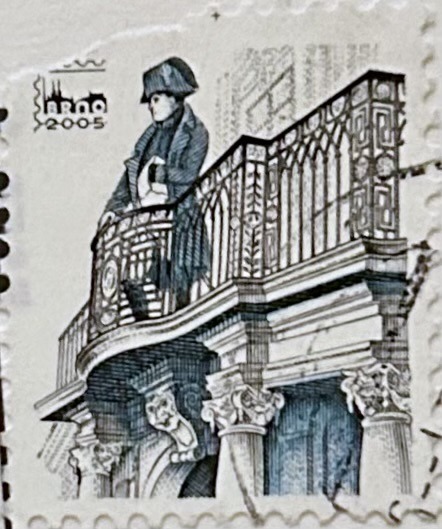
View On WordPress
#-brazil#-chief#-Czech republic#-disney#-europe#-fairbanks#-germany#-Grand Duke Henri#-green#-Hemchandra Vikramaditya#-india#-Jonas fjeld#-Jose bonifacio#-luxenbourg#-Napoleon#-native american#-norway#-notable humans#-pope#-standing bear#-USA#-wegscheider#Ataturk#austria#Benedict XVI#turkey
0 notes
Link
#KISchulung#KISeminar#KIUnterricht#KIUpdates#KünstlicheIntelligenzaktuell#KünstlicheIntelligenzExperte
0 notes
Text
Der arme Pöt
Nicht ganz dichte Dichtungen und (Un)Gereimtes Herne Herr Beuno von Zwipflo im BockenlandEinst in seinem Garten stand,Und kam die warme Frühlingszeit,Goldene Blüten leuchteten weit,von Pastinaken lang und dick,Denn Pastinaken waren sein Glück.Und wenn es Mittag vom Turme scholl,Dann packt Beuno sind alle Taschen voll,Mit Pastinaken, Töften, Myrthen,Die Hobbits in Wegscheid zu bewirten.Kam da…

View On WordPress
0 notes
Text
Odessa – auch die Verschweiger sind schuldig — RT DE
Neun Jahre ist er her, der zweite Mai 2014 in Odessa. Neun Jahre, in denen das Verbrechen nicht geahndet wurde; im Gegenteil, in denen es beinahe unter den vielen Folgetaten verschwand. Aber das Datum bleibt eine Wegscheide, an der der Westen sich entschied, die Verbrecher zu stützen. — Weiterlesen freeassange.rtde.life/meinung/169061-odessa-auch-verschweiger-sind-schuldig/
View On WordPress
0 notes